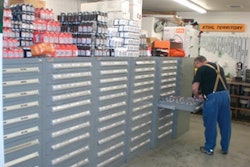They are your best friends, and sometimes your worst. They are the backbone of your business. They can be loyal, but they can run to the competition for a lower price in a heartbeat. They can also be slow to pay you. In this article, I'd like share what your contractor customers want—and what you can do to provide it.
First off, contractors are not complicated people. They want to make money, and they want to make as much as possible with the least amount of wasted motion and effort.
Second, contractors can be narrow-minded. They often suffer from tunnel vision, which causes them to make decisions that appear to be penny-wise and pound-foolish. Keep in mind that most of them have little business management experience. They are small owner-operators whose businesses have been their only job—ever.
Notice that I did not call them entrepreneurs or business people. This is not a statement of disrespect. It is a statement of fact that most will confess is true and accurate. Nonetheless, they are smart people who know value when it is explained to them. They will understand how you can help them make money.
Here's what many dealers think contractors are interested in (in order of priority):
• Price
• Product
• Service
• Ideas
In reality, here's what most contractors need and want:
• Ideas
• Service
• Product
• Price
It's just that they won't tell you this directly. Plus, the two of you have been locked up in the price dance for so long that you talk about little else. This type of dance never builds real loyalty and certainly isn't great for your gross margins—or theirs. So there it is: Gross profits must be built upon a better relationship driven by variables other than price.
Let's start with some basics established by a survey of the customers of the top manufacturing and distribution companies in the U.S. The study concluded the following: Customers were more loyal when their salesperson or vendor:
• Managed the customer satisfaction personally
• Understood the customer's business
• Expertly recommend solutions
• Solved problems
Managing The customer satisfaction personally
A good relationship is based on a shared sense of destiny and courteous service. Your computer system must be designed to capture information such as personal data, purchasing history, and product likes and dislikes. You can mine this information to keep track and "remember" customer preferences, and to contact your customers with new information regarding products and availability.
Contractors love dealers that remember their names and preferences, and are proactive in sending them information that can help them make money. Have your salespeople call your best customers at least monthly, and send out weekly e-mails on new ideas, products and pricing promos.
Understanding the customer's business
Every day is a crisis day and a firefighting experience for a contractor. Trust me, there is rarely a day when "it works." Their biggest problem is lack of help and expertise. It is not figuring out how to help you sell them more stuff.
But it's more stuff that you want to sell them. Your salespeople must keep in mind that the average contractor has poor systems for material acquisition. Many contractors could use a lot of help in planning forward, tracking inventory, and having the right stuff available when they need it.
What's the answer? Get on-site and show contractors how to manage materials. In fact, help them set up an "in-house store" with minimum stocking and reorder points for their most basic and frequently used parts and pieces. It's the little orders that kill them, not the big ones.
Expertly Recommend Solutions
Train your sales staff to be problem-solving experts from the contractor's point of view, not the factory's point of view. Contractors admire the MacGyver factor. They are practical people who value practical solutions and fixes.
You should meet with your sales staff monthly to brainstorm about the most frequently ordered products, the ones that come back broken most often, and determine solutions and some prepackaged kits to address these "problems." By doing this you become the expert, and you end up saving your contractor customers money.
They appreciate someone who looks out for them.
Solving problemsI
If it breaks, fix it—or give them something in the meantime so they can keep on working. You can even charge them for this service, within reason. Every company on the planet sells some kind of service contract as insurance against downtime. Downtime is the enemy of every contractor. Keep your contractors up and running and they make more money, plain and simple.
That's what they want and need. Now it's your job to deliver it to them. Just like it's easier for you to work with a minimal number of suppliers, it's easier for a contractor to work with a minimal number of dealers. In fact, working with just one or two dealers is every contractor's dream.
They also need a real partner who will provide help. Contractors will get over the low price tunnel vision when you deliver. Show them on their bottom line that they made more money with you. Even though they may have paid a little higher price on some items, in the end they saved money in so many other ways.
About the Author
Kevin Kehoe is the owner-manager of Kehoe & Co. (www.kehoe.biz). He is an experienced and inspiring speaker, consultant, author and business educator who brings 20-plus years of "real world" business management experience to a conference setting, the boardroom or your training program. He is a published author of several books and more than 150 business and trade magazine articles. Kehoe has also been a judge for the Yard & Garden Dealers in Excellence Awards.



















